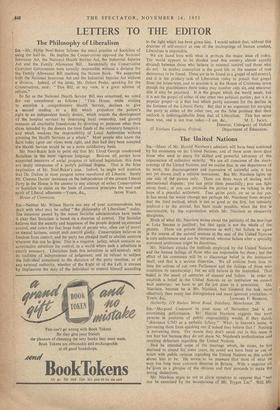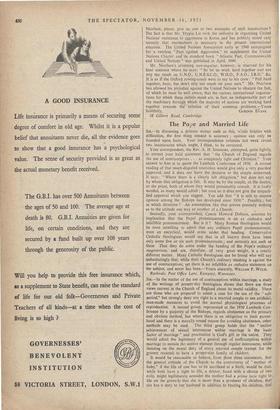SIR, —Marginal Comment in your issue of November 2nd is an
astonishing performance. Mr. Harold Nicolson suggests that most persons in positions of public responsibility would, if they dared, "denounce UNO as a pathetic fallacy." . What, in heaven's name, is preventing them from speaking out if indeed they believe that ? Nothing is preventing them. The reason they don't speak out in this sense is not fear but because they do not share Nr. Nicolson' s perfectionism and resulting defeatism regarding the United Nations.
Had he attended some of the meetings which, he states, he has declined to attend for some years, he could not have been so out of touch with public opinion regarding the United Nations as this article shows him to be. He seems to be unaware that most of what he says has long been common doctrine in Britain. With a superior air hegives us a glimpse of the obvious and then proceeds to make tbo wrong deductions.
Mr. Nicolson urges us not to allow ourselves to suppose that "war can be exorcised by the incantations of Mr. Trygve Lie." Will Mr. Nicolson, please, give us one or two examples of such incantations ? The fact is that Mr. Trygve Lie took the initiative in organising United Nations' resistance to aggression in Korea and has publicly stated only recently that rearmament is necessary in the present international situation. The United Nations Association early in 1948 campaigned for a vetoless "Pact against Aggression" to supplement the United Nations Charter and its standard book "Atlantic Pact, Commonwealth and United Nations" was published in April, 1949.
Mr. Nicolson's crowning non-sequitur, however, is reserved for his final sentence where he says: "So let us work hard together and not rely too much on U.N.O., U.N.E.S.C.O., W.H.O., F.A.O., I.R.O." &c. It is as if the Oxford rowing-coach were to say to his crew: "Pull hard together, boys, but don't rely too much on your oars." Mr. Nicolson has allowed his 'prejudice against the United Nations to obscure the fact, of which he must be well aware, that the various international organisa- tions for which these initials stand are, in fact, an indispensable part of the machinery through which the majority of nations are working hard together towards the solution of their common problems.—Yours















































































 Previous page
Previous page